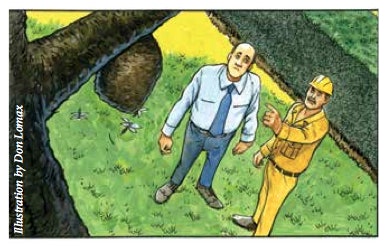
What the expert says: Since people often are unaware of such allergies, “every landscape crew should have an Epi-pen,” says Dr. Michael Zimring, an internist and director of the Center for Wilderness and Travel Medicine at Boston’s Mercy Medical Center. These auto-injectors make it easy to dispense the right amount of epinephrine, which can save lives by treating anaphylactic shock. But because the drug wears off, you must go to the hospital for a steroid shot, Zimring says. Have an antihistamine such as Benadryl on hand as well. Other symptoms of an allergic reaction include itching and swelling at the sting site, rash, and airway constriction.
Stinging insects can build their colonies underground or attached to vegetation and structures. If you see some flying around, keep in mind that a nest could be nearby. It's always important to be alert.
Know whether dangerous snakes and spiders are likely to be found in your area and, if so, how to recognize them. View photos of these species and maps showing where they live at.
Approximately 45,000 snakebites occur in the country each year, but fewer than 8,000 are by venomous snakes and about six of those are fatal, according to the Merck Manual of Medical Information. Your county extension office and local police department can help find experts to relocate poisonous snakes. If a co-worker is bitten, get a description of the snake and transport the person to the nearest hospital. Also seek medical attention for spider bites (almost all spiders are venomous, but few have fangs capable of breaking skin).
Ticks pose a hazard because they can carry Lyme disease. Use insect repellant during warm months and shower and inspect your body daily. Remove ticks with fine-tipped tweezers and make sure no parts remain in your skin. If you experience flu symptoms in summer or have an expanding rash around a bite, see a doctor.









